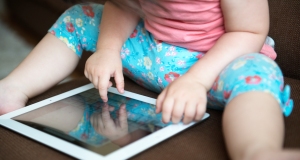 Based on my nannying experience there is a common belief by parents that screen time should be limited for children – leaving more time for activities like playing outdoors, reading, or board games. However, if you go to the waiting room at a doctor’s office or go out to dinner you will see young children using smart phones and tablets. Many apps now are geared towards a young audience and even said to be educational. I wondered if there was any neurobiological evidence that smart screen time on phones and tablets has negative effects on young children’s development. It turns out that most of the research focuses on the effects of the amount of television on childhood development and the participants are older children. For example one 2004 study (Christakis, et al.) found TV time was associated with attentional problems in children. Another study (Takeuchi, et al., 2013) found increases in brain changes as the amount of tv watched went up. Some grey matter volumes were larger in children who watched more tv than controls and this was associated with a lower verbal IQ. Although there is not much published research on younger children and smart screen time, we do know that toddlers learn better from face-to-face interactions than they learn from television and videos (Boston University Medical Center). However, tablet and smart phone applications have interactive capabilities that may distinguish them from videos, but this has yet to be tested. Another researcher suggested that because smart screen time takes away from face to face interaction, just as tv does, we may see similar impairment in language and social skills. Similarly, hands-on activities are important in developing sensorimotor and visual-motor skills. Because the research is scarce on smart phone and tablet use with toddlers many researchers have simply suggested that they should not be used as a distraction tool because this takes away from important face to face interaction and hands on learning. Some even suggested that when young children are using a tablet or smart phone the caregiver should be involved too in order to help enhance the device’s educational value. As Helen Thompson, who also researched this topic, puts it “a little tablet time probably won’t fry a toddler’s brain”. Work Cited: Christakis, et. al., (2004). Early television exposure and subsequent attentional problems in children. Pediatrics, 113, 708-713. Mobile and interactive media use by young children: The good, the bad and the unknown. (2013, January 30). Retrieved March 7, 2015, from http://www.sciencedaily.com/releases/2015/01/150130102616.htm Sanders, L. (2013, December 2). TV linked with brain changes in kids. Retrieved March 7, 2015, from https://www.sciencenews.org/blog/growth-curve/tv-linked-brain-changes-kids Takeuchi, et. al., (2015). The impact of parent–child interaction on brain structures: cross-sectional and longitudinal analyses. The Journal of Neuroscience, 35, 2233-2245. Thompson, H. (2015, February 26). A little tablet time probably won’t fry a toddler’s brain. Retrieved March 7, 2015, from https://www.sciencenews.org/blog/growth-curve/little-tablet-time-probably-won’t-fry-toddler’s-brain?mode=topic&context=69
Based on my nannying experience there is a common belief by parents that screen time should be limited for children – leaving more time for activities like playing outdoors, reading, or board games. However, if you go to the waiting room at a doctor’s office or go out to dinner you will see young children using smart phones and tablets. Many apps now are geared towards a young audience and even said to be educational. I wondered if there was any neurobiological evidence that smart screen time on phones and tablets has negative effects on young children’s development. It turns out that most of the research focuses on the effects of the amount of television on childhood development and the participants are older children. For example one 2004 study (Christakis, et al.) found TV time was associated with attentional problems in children. Another study (Takeuchi, et al., 2013) found increases in brain changes as the amount of tv watched went up. Some grey matter volumes were larger in children who watched more tv than controls and this was associated with a lower verbal IQ. Although there is not much published research on younger children and smart screen time, we do know that toddlers learn better from face-to-face interactions than they learn from television and videos (Boston University Medical Center). However, tablet and smart phone applications have interactive capabilities that may distinguish them from videos, but this has yet to be tested. Another researcher suggested that because smart screen time takes away from face to face interaction, just as tv does, we may see similar impairment in language and social skills. Similarly, hands-on activities are important in developing sensorimotor and visual-motor skills. Because the research is scarce on smart phone and tablet use with toddlers many researchers have simply suggested that they should not be used as a distraction tool because this takes away from important face to face interaction and hands on learning. Some even suggested that when young children are using a tablet or smart phone the caregiver should be involved too in order to help enhance the device’s educational value. As Helen Thompson, who also researched this topic, puts it “a little tablet time probably won’t fry a toddler’s brain”. Work Cited: Christakis, et. al., (2004). Early television exposure and subsequent attentional problems in children. Pediatrics, 113, 708-713. Mobile and interactive media use by young children: The good, the bad and the unknown. (2013, January 30). Retrieved March 7, 2015, from http://www.sciencedaily.com/releases/2015/01/150130102616.htm Sanders, L. (2013, December 2). TV linked with brain changes in kids. Retrieved March 7, 2015, from https://www.sciencenews.org/blog/growth-curve/tv-linked-brain-changes-kids Takeuchi, et. al., (2015). The impact of parent–child interaction on brain structures: cross-sectional and longitudinal analyses. The Journal of Neuroscience, 35, 2233-2245. Thompson, H. (2015, February 26). A little tablet time probably won’t fry a toddler’s brain. Retrieved March 7, 2015, from https://www.sciencenews.org/blog/growth-curve/little-tablet-time-probably-won’t-fry-toddler’s-brain?mode=topic&context=69
Filed under: Morgan Tagged: childhood development, face to face interaction, smart phones, tablets, technology








 Based on my nannying experience there is a common belief by parents that screen time should be limited for children – leaving more time for activities like playing outdoors, reading, or board games. However, if you go to the waiting room at a doctor’s office or go out to dinner you will see young children using smart phones and tablets. Many apps now are geared towards a young audience and even said to be educational. I wondered if there was any neurobiological evidence that smart screen time on phones and tablets has negative effects on young children’s development. It turns out that most of the research focuses on the effects of the amount of television on childhood development and the participants are older children. For example one 2004 study (Christakis, et al.) found TV time was associated with attentional problems in children. Another study (Takeuchi, et al., 2013) found increases in brain changes as the amount of tv watched went up. Some grey matter volumes were larger in children who watched more tv than controls and this was associated with a lower verbal IQ. Although there is not much published research on younger children and smart screen time, we do know that toddlers learn better from face-to-face interactions than they learn from television and videos (Boston University Medical Center). However, tablet and smart phone applications have interactive capabilities that may distinguish them from videos, but this has yet to be tested. Another researcher suggested that because smart screen time takes away from face to face interaction, just as tv does, we may see similar impairment in language and social skills. Similarly, hands-on activities are important in developing sensorimotor and visual-motor skills. Because the research is scarce on smart phone and tablet use with toddlers many researchers have simply suggested that they should not be used as a distraction tool because this takes away from important face to face interaction and hands on learning. Some even suggested that when young children are using a tablet or smart phone the caregiver should be involved too in order to help enhance the device’s educational value. As Helen Thompson, who also researched this topic, puts it “a little tablet time probably won’t fry a toddler’s brain”. Work Cited: Christakis, et. al., (2004). Early television exposure and subsequent attentional problems in children. Pediatrics, 113, 708-713. Mobile and interactive media use by young children: The good, the bad and the unknown. (2013, January 30). Retrieved March 7, 2015, from http://www.sciencedaily.com/releases/2015/01/150130102616.htm Sanders, L. (2013, December 2). TV linked with brain changes in kids. Retrieved March 7, 2015, from https://www.sciencenews.org/blog/growth-curve/tv-linked-brain-changes-kids Takeuchi, et. al., (2015). The impact of parent–child interaction on brain structures: cross-sectional and longitudinal analyses. The Journal of Neuroscience, 35, 2233-2245. Thompson, H. (2015, February 26). A little tablet time probably won’t fry a toddler’s brain. Retrieved March 7, 2015, from https://www.sciencenews.org/blog/growth-curve/little-tablet-time-probably-won’t-fry-toddler’s-brain?mode=topic&context=69
Based on my nannying experience there is a common belief by parents that screen time should be limited for children – leaving more time for activities like playing outdoors, reading, or board games. However, if you go to the waiting room at a doctor’s office or go out to dinner you will see young children using smart phones and tablets. Many apps now are geared towards a young audience and even said to be educational. I wondered if there was any neurobiological evidence that smart screen time on phones and tablets has negative effects on young children’s development. It turns out that most of the research focuses on the effects of the amount of television on childhood development and the participants are older children. For example one 2004 study (Christakis, et al.) found TV time was associated with attentional problems in children. Another study (Takeuchi, et al., 2013) found increases in brain changes as the amount of tv watched went up. Some grey matter volumes were larger in children who watched more tv than controls and this was associated with a lower verbal IQ. Although there is not much published research on younger children and smart screen time, we do know that toddlers learn better from face-to-face interactions than they learn from television and videos (Boston University Medical Center). However, tablet and smart phone applications have interactive capabilities that may distinguish them from videos, but this has yet to be tested. Another researcher suggested that because smart screen time takes away from face to face interaction, just as tv does, we may see similar impairment in language and social skills. Similarly, hands-on activities are important in developing sensorimotor and visual-motor skills. Because the research is scarce on smart phone and tablet use with toddlers many researchers have simply suggested that they should not be used as a distraction tool because this takes away from important face to face interaction and hands on learning. Some even suggested that when young children are using a tablet or smart phone the caregiver should be involved too in order to help enhance the device’s educational value. As Helen Thompson, who also researched this topic, puts it “a little tablet time probably won’t fry a toddler’s brain”. Work Cited: Christakis, et. al., (2004). Early television exposure and subsequent attentional problems in children. Pediatrics, 113, 708-713. Mobile and interactive media use by young children: The good, the bad and the unknown. (2013, January 30). Retrieved March 7, 2015, from http://www.sciencedaily.com/releases/2015/01/150130102616.htm Sanders, L. (2013, December 2). TV linked with brain changes in kids. Retrieved March 7, 2015, from https://www.sciencenews.org/blog/growth-curve/tv-linked-brain-changes-kids Takeuchi, et. al., (2015). The impact of parent–child interaction on brain structures: cross-sectional and longitudinal analyses. The Journal of Neuroscience, 35, 2233-2245. Thompson, H. (2015, February 26). A little tablet time probably won’t fry a toddler’s brain. Retrieved March 7, 2015, from https://www.sciencenews.org/blog/growth-curve/little-tablet-time-probably-won’t-fry-toddler’s-brain?mode=topic&context=69

